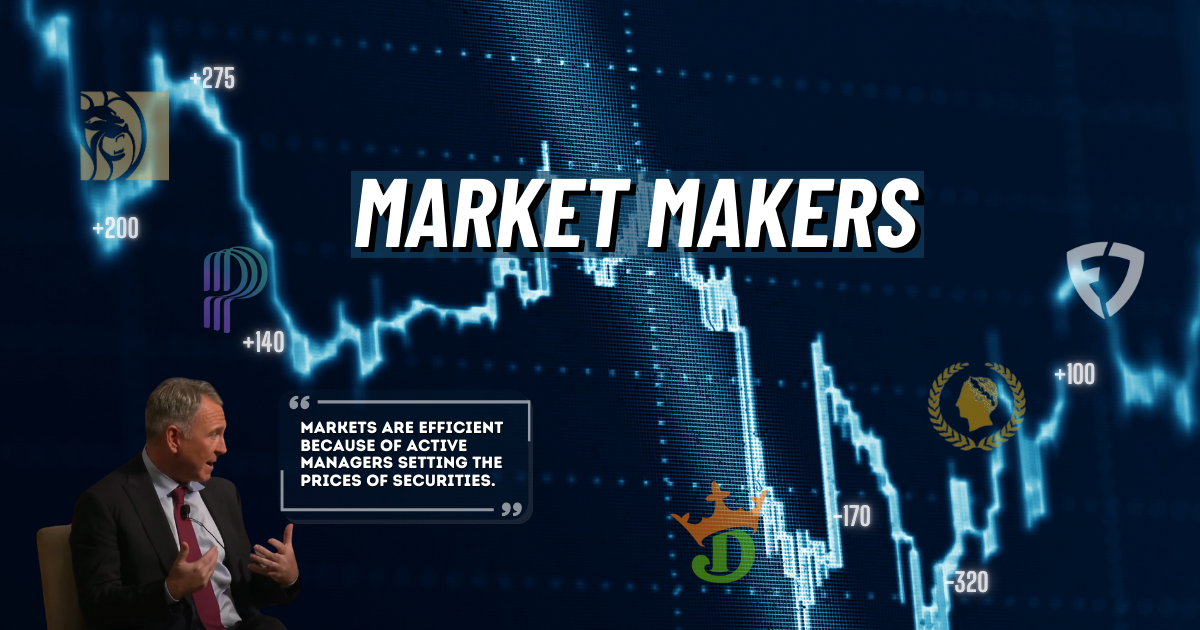Market Makers And Efficient Market Hypothesis in Sports Betting
Stock markets are based on supply and demand, right? No. Wrong. Well, kind of wrong.
Ken Griffin of Citadel (the leading designated market maker for the New York Stock Exchange) has a different take:
“Markets are efficient because of active managers setting the prices of securities. Firms like Citadel, Fidelity, and Viking Global Capital Research run large teams engaged in fundamental research to drive the value of companies.“
Why Are Market Makers Important?
Here are a few reasons:
- Liquidity: without market makers, there may or may not always be a buy/sell price for a stock. Their presence mostly guarantees a buy or sell opportunity for others.
- Stability: by consistently quoting buy and sell prices and creating more narrow bid/ask spreads, market makers reduce volatility.
- Risk: the inventory surpluses created by buying when there are more sellers and selling when there are more buyers, assume the risk so other market participants do not have to.
There are plenty of other reasons, but each of these important characteristics feeds to one principle: the efficient market hypothesis.
The Efficient Market Hypothesis (EMH)?
Before anything else, it is a framework to understand. It is NOT gospel, a sole sourced truth, or an absolute.
It states, generally, that prices on traded markets already reflect all available information (remember Mr. Griffin’s quote above). So, at any given time, every shred of information has already been factored into the price. Or as a family member says, “all the things”.
There’s a reason, just like financial markets, that strong form EMH for sports betting markets cannot be considered. Strong form EMH would imply that no one, not even insiders like coaches or players, could consistently beat the odds, which seems less applicable due to the potential for insider information in sports.
And, since no one believes that to be true, herein lies the conflict for market makers (or those, “active managers setting the prices of odds [securities]”.
Information inefficiencies or information lag can be found and applied to update or adjust odds/pricing through methods like communication or monitoring money flows by certain groups and individuals.
Enter Sports Betting Markets/Makers
People may try to tell you betting markets are “you against the house” not “you against other people” like trading markets. That’s only half true. A defining characteristic of market makers is to buy at “wholesale” and sell at “retail”. Simple enough.
Changing the understanding of market makers in betting markets to be viewed through that lens changes quite a bit.
These market makers in sports betting markets are a little different than the financial market makers because while, sports betting market makers:
A. Provide stability
B. Provide liquidity
C. Abate risk
they only perform these measures for the other institutions (sportsbooks both licensed and unlicensed – yeah, shocking we know, operators, syndicates, etc.). Currently, limiting sports bettors and an ability to change odds/payouts at will, suggest A, B, and C (plus the other characteristics) are not provided to the retail side. Only the wholesale counterparties.
Efficient, Dynamic, Lag
Sports betting markets can be seen as efficient in terms of quickly incorporating information into odds, there are elements suggesting they might not fully adhere to the EMH, especially in its stronger forms:
- Practical Efficiency: The market might be “practically efficient,” where beating the odds consistently requires either significant expertise, access to insider information, or an edge in statistical modeling, much like in financial markets where some strategies or traders can outperform over short periods.
- Dynamic Odds: The ability of bookmakers to adjust odds in real-time based on betting patterns suggests an efficiency mechanism, but this efficiency might not extend to perfect knowledge or perfect pricing.
- Information Lag and Insider Edge: The possibility of insider information or delayed public information dissemination could introduce inefficiencies.
Time and market maturity will tell how efficient these markets can be and what the role of market makers will be. For now, subscribe to learn more and check out some of our other topics/content. If you enjoy these, please let a friend know. Enjoy.



